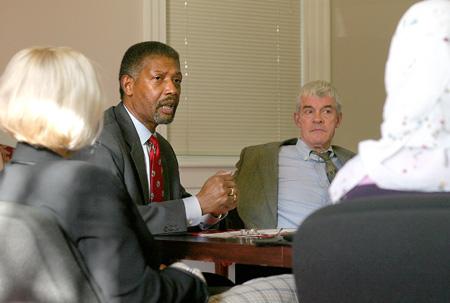University administrators discussed their plans for the future of advising, MyPack Portal and the new University Web site, based on student, staff and faculty feedback in the Chancellor’s Liason meeting Wednesday.
Dean for Undergraduate Academic Programs Thomas Conway said advising has made significant strides since he began working at the University, but said there is also much left to be done.
“I would have to say we’ve made significant progress,” he said at the meeting.
According to Conway, the University offers many types of advising avenues, including peer, graduate student, faculty and professional advising.
Faculty generally work with groups of 25 to 50 students, while professional advisers can oversee as many as 1,500 students, he said.
Carl Hughes, a junior in First Year College, said he has had issues with his professional and faculty advisers in FYC.
“My first three [advisers] weren’t that great — the first one left, the second was the head, so she didn’t have much time for me, and the third was a temporary one they hired,” he said. “The fourth one had about three months of experience when I got her, and she’s been my adviser since the end of freshman year.”
According to Conway, Provost Larry Nielsen has promised to hire 19 advisers over the next three years to assist in the betterment of the program.
He said the University will also continue to use both professional and faculty advisers.
“It would be a mistake to ever assume that professional advisers could ever replace faculty advisers,” he said at the meeting. “I don’t want us to get into a model where we have just faculty advising or professional advising.”
Conway also discussed a program particularly for undecided students like Hughes.
The Office of Advising Support, Information and Services, which currently serves hundreds of students, holds consultations specifically for students who are between majors or are undeclared, he said.
Hughes said he had not heard of OASIS.
“[My advisers] wouldn’t want to tell me about that ’cause I’d leave them,” he said.
According to Hughes, “liaison advisers” that informed students about specific majors and their curricula but did not necessarily do full-time advising would be a good intermediary for the advising program.
“We’ll continue to work with the colleges and departments to evaluate those programs,” Conway said.
Hughes said, however, he has taken away one lesson from his encounters with advisers.
“Advising is a good thing,” he said. “As long as you don’t trust your adviser.”
In addition to OASIS and other forms of advising, the Division of Undergraduate Academic Programs set up a Web site — www.ncsu.edu/success — to allow students to voice their opinions on advising and other academic issues this fall, he said.
“There were students who wanted to have their perspectives given in these discussions,” Conway said.
Bobby Mills, student body president and junior in political science and economics, said he had not heard of the site before attending Wednesday’s meeting.
The Web site may need more advertisement, according to Conway.
Debbie Griffith, associate vice chancellor for public affairs, talked about the University homepage at the meeting.
She said the new face of the University’s Web site had received a good amount of feedback through Web analytics, which track what links and pages are most used and important.
Griffith said this will indicate to the new Webmasters how to improve the site in the future.
“Thanks to funding that the University provided, we now have four positions that manage our core Web site,” she said.
The Web site, however, is not geared only toward students, she said.
MyPack Portal is the best student resource, Leslie Dare, director of distance education and technology services, said.
Hughes agreed.
“MyPack is actually easier to use [than PackTracks] — easier to navigate — let’s put it that way,” he said. “They kept the things that were good about the old system. I expected to have more problem than I did.”
Dare said the program, which replaced PackTracks when it launched this fall, has ample opportunity to provide feedback.
“We know that [feedback] is an important piece of this very new process,” Dare said.
According to Dare, improvements to MyPack will soon include the accidentally omitted Study Abroad tab, adding student records by the fall of 2008 and hopefully integrating WebCT Vista into the system.








